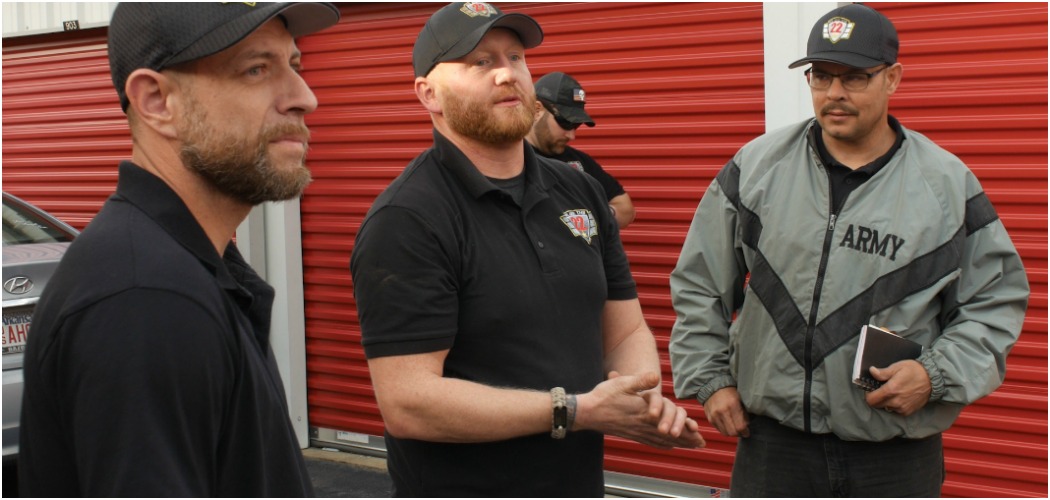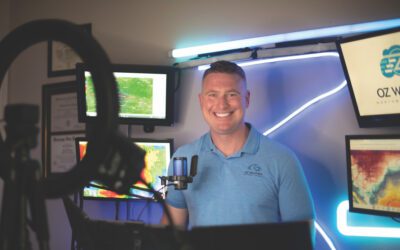[title subtitle=”words Dwain Hebda
images: courtesy We Are The 22
“][/title]
We Are The 22 is a nonprofit group whose mission is to combat veteran suicide through direct, peer-based suicide prevention. Their teams are on standby twenty-four hours a day to respond in person to Arkansas veterans in suicidal crisis to provide peer support and get them the help they need. This is their story.
Veteran Mikel Brooks was born February 17, 2017, for the second time. Earlier in the day he’d decided he’d reached his limit, that the homelessness and the pain and the drugs had finally used him up. He made the decision to take his own life, closed his eyes and waited for what was next.
No one was more surprised than he was, not just for having come back, but that a suicide attempt could give him a purpose. “When I had my suicide attempt, at that moment, I was a homeless veteran,” he says. “I knew there were plenty more vets like me. So, I began going around talking to veterans asking,
‘Why are we not doing more? Why can’t we do more? What’s stopping us from doing more?’
“An idea began to grow, and I began to get some very good people around me. We began to work out details, figuring out how we could save vets’ lives.”
Incredibly, just ninety days after trying to take his own life, Mikel founded We Are The 22, a nonprofit dedicated to taking the gun – sometimes literally – out of the hands of veterans who are facing many of the same desperate conditions he did.
“When I founded this, there was nothing to go off of. There was no blueprint. There was nobody else doing it to this degree anywhere that I could find,” Mikel says. “We literally had to draw it up from scratch to figure out what worked and what didn’t. The first year was a learning curve.”
That curve may have been steep, but Mikel and his band of fellow vets proved fast learners. Last year, We Are The 22 teams responded to one hundred Arkansas veterans in crisis and didn’t lose a single one of them. In meth houses and from behind locked doors, through tears of rage and the tortured souls of the wounded and addicted, they pulled every one of them back from the brink.
“When we show up and knock on their door at two a.m. and we take that gun out of their hands, we say, ‘Hey, man, we get it. We understand.’ And when they tell us that we don’t, we can point to the scars on our own bodies from our own attempts and our own struggles and we say, ‘Yeah, we get it, brother. We’ve been there.’”
***
From his earliest memory, Mikel Brooks knew he was born for the military. At seventeen, he convinced his mother to sign his papers allowing him to enlist in the United States Army. “It’s all I ever wanted to do,” he says. “I graduated infantry school in 2001; a month later September 11 happened.”
It was a sacred responsibility, deployment, but it was also a wild adventure for a kid from Bald Knob, Arkansas. His first two tours sent him to Egypt for six months on the Sinai Peninsula by the Israeli border then as part of the invasion of Iraq. Coming home, he was sent to the rising black waters of Hurricane Katrina where he stood on the Super Dome and helped evacuate people from the overloaded Convention Center.
All in all, it was a dream come true until on his third trip to the Middle East – this time as a combat engineer – things went sideways. The end came seemingly faster than the time it takes him to tell it. “I was wounded,” he says, “I was decorated for valor, so I have a Purple Heart, and I was retired from my injuries in ‘09.”
When asked if it was worth it, Mikel replies, “Absolutely,” blinks quickly. “Traveled the world.”
***
Any way you look at it, the issue of suicide among America’s heroes is a national tragedy. According to Department of Veterans Affairs figures released last June, suicide among veterans ages eighteen to thirty-four jumped thirty-two percent between 2001 and 2014; ten percent between 2015 and 2016 alone. And in January of this year, the VA reported 2018 saw record suicides among active personnel too, with fifty-seven Marines, sixty people eight sailors, fifty-eight airmen and one hundred and thirty-eight soldiers ending their own lives.
The reasons for the spike vary depending on who you talk to, but all seem to agree that difficulty in adjusting to civilian life play a major factor as do physical issues or mental illness arising from one’s service. And all the contributing elements are magnified when drug or alcohol abuse enters the picture, as it often does.
Mikel is the poster child for these risk factors. His war injuries left him prone to seizures and therefore unable to work, not to mention gaining him a nasty addiction to pain meds dating back to before he was discharged. He found himself back home with nothing to do but self-medicate in mourning the loss of his health, his job and his very identity.
“I struggled when I got out,” he said. “I felt like I had lost everything that made me who I am. Like, my uniform was my own image of myself and when they took that it threw me into a pretty deep depression. That’s when I began abusing the opiates.
That pretty much set the path. “Understand that for ten years, from ‘09 until now, I spent a majority of that time homeless, strung out on drugs. I was an intravenous methamphetamine user. I went down the worst paths. And when I tried to find my way back out in 2017, because I have seizures, I’m unemployable.”
Waking up from his suicide attempt, he started to picture how many other veterans – male and female – were fighting the same battles he was. And while the problem was receiving a lot of news coverage, nobody seemed to be doing anything. So, he rose to volunteer for the mission.
We Are The 22 (the name is a reference to the average twenty-two vets that die daily by their own hand) numbers forty-five volunteers across the state of Arkansas and growing. When a call comes in over the group’s hotline, two-person teams mobilize to personally intervene with a fellow vet in distress. The teams, which include female vets to serve their sisters in arms, are specially trained to talk a person down and get them some help, a ride to the nearest VA hospital, anything.
“A lot of the times we’re in route at two or three in the morning. They don’t even know we’re coming because their friends or families have told us what was going on,” Mikel says. “We just how up out of the blue, knock on their door and say ‘Hey, man, we heard you’re struggling.’
“Just the fact that two veterans showed up and sat down in the dope house or sat down with them in whatever the situation may be to talk to them and genuinely look them in the face and care, to help them get the help they need right there on the spot, tends to get through to them.”
We Are The 22 has also developed connections with police departments and the VA in order to work together to save lives. It’s a key component to the program and especially for the next chapter of Mikel’s dream, which is to see We Are The 22 chapters all over the country. That one will take time, but time, once so cheaply given away, is suddenly back on Mikel’s side with his comrades at his back.
“A lot of [the organization’s volunteers] are on disability. A lot of them are disabled veterans themselves,” he said. “A lot of them don’t work because of their disability, but they can do this.
They can get up and they can go share their time with other veterans. There’s nothing that compares to the feeling of going to a veteran who’s struggling and talking him down, taking the weapon or whatever out of his hands, getting him to the VA. “We provide the veterans in our teams with a uniform, with a purpose and a mission. To be honest with you, we’re saving as many veterans by simply giving them something to do that makes a difference, as we are actually responding to calls.”
At that he pauses, as if marveling at the awesome responsibility that We Are The 22 has come to carry in such a short time. “We have some of the most dedicated veterans that get out there and do this without any glory, without any publicity, without gain of their own at all,” he says. “We have a bunch of guys who get up at the drop of a hat and respond to another veteran. To me, that is one of the most amazing things about all of this.”
For more information on volunteering or to make a donation, please visit WeAreThe22.com.




